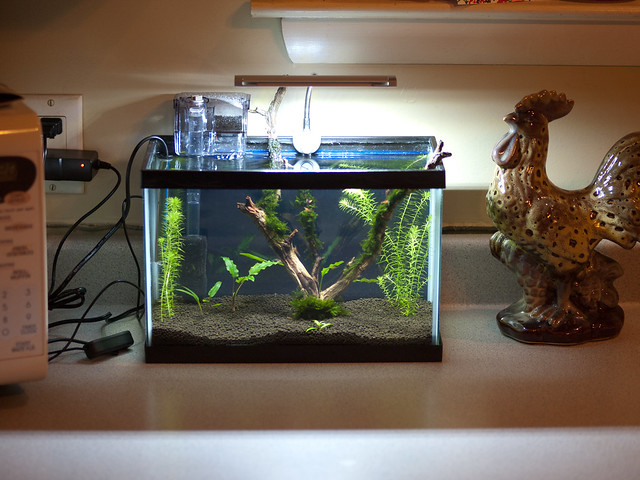LED lighting...Huh?
- FrannyB
- Posts: 768
- Joined: Mon Nov 24, 2003 3:00 pm
- Real Name: Francine Bethea
- Location: Gwynn Oak, MD 21207
- Contact:
LED lighting...Huh?
Someone please explain to me how LED could enhance the growth of your plants. From what I see the LEDs bascially light your tank, but are not beneficial to the growth. Further, they are WAY expensive. Seems to me that this lighting would limit one to small tanks.
- FrannyB
- Posts: 768
- Joined: Mon Nov 24, 2003 3:00 pm
- Real Name: Francine Bethea
- Location: Gwynn Oak, MD 21207
- Contact:
Re: LED lighting...Huh?
Further, if I prefer Aquafloras and midday, are LED's available to deliver that combination?
Re: LED lighting...Huh?
LEDs are just another form of artifical light.
The benefits are that they last a long time, supposedly 40,000 to 50,000 hours, so there is no need to keep buying replacement bulbs. I would like to see warranties that reflect those claims, since they seem to be charging a premium for it. Also, LEDs are energy efficient, and use much less power than halides or fluorescent fixtures.
I think the main drawback right now is price. Finding a commercially available LED fixture that is both economical and effective for growing freshwater plants is difficult, especially if you want a high output lighting system on a larger tank. Maybe that is why you see a lot of low tech LED nano tanks.
Sometimes the light spectrum of the LEDs are given in Kelvins, i.e. 7000K or 10000K, and other times in wavelength, i.e. 460nm or 700nm. The later is a little more confusing for me personally, I'm just more familiar with the former.
The benefits are that they last a long time, supposedly 40,000 to 50,000 hours, so there is no need to keep buying replacement bulbs. I would like to see warranties that reflect those claims, since they seem to be charging a premium for it. Also, LEDs are energy efficient, and use much less power than halides or fluorescent fixtures.
I think the main drawback right now is price. Finding a commercially available LED fixture that is both economical and effective for growing freshwater plants is difficult, especially if you want a high output lighting system on a larger tank. Maybe that is why you see a lot of low tech LED nano tanks.
Sometimes the light spectrum of the LEDs are given in Kelvins, i.e. 7000K or 10000K, and other times in wavelength, i.e. 460nm or 700nm. The later is a little more confusing for me personally, I'm just more familiar with the former.
Joe
Re: LED lighting...Huh?
Joe is spot on. Here's a great thread on TPT listing out the strength of many commercial fixtures. You'll notice that many are rather high light output, but the cost is more:
http://www.plantedtank.net/forums/showt ... p?t=160396
In terms of color, your Aquafloras and middays change over time, LEDs are fixed in what they output. There's no fixture that specifically says that they produce the same color light as a midday, so you would need to go through the process of evaluating the different LED fixtures to find one that looks right to you, and is suitable for plant growth.
http://www.plantedtank.net/forums/showt ... p?t=160396
In terms of color, your Aquafloras and middays change over time, LEDs are fixed in what they output. There's no fixture that specifically says that they produce the same color light as a midday, so you would need to go through the process of evaluating the different LED fixtures to find one that looks right to you, and is suitable for plant growth.
- chris_todd
- Posts: 1118
- Joined: Fri Oct 03, 2008 11:05 pm
- Location: Catonsville
Re: LED lighting...Huh?
If I can borrow the PAR meter, I'll measure the output of my Kessil A150W LED pendant. I like how the light color looks, but its only been above the terrarium for a week, so I don't have any data on growth. It's supposedly 6700 K.
- FrannyB
- Posts: 768
- Joined: Mon Nov 24, 2003 3:00 pm
- Real Name: Francine Bethea
- Location: Gwynn Oak, MD 21207
- Contact:
Re: LED lighting...Huh?
How does one effectively evaluate LED fixtures?
Thanks for the link, Kris.
Thanks for the link, Kris.
Re: LED lighting...Huh?
Depending on what you're paying for bulbs and which LED fixture you go with, the pay back period on these can be incredibly quick.
Roughly, each watt of electricity costs you $0.35-$0.50 per year for lights (depending on usage. The lower end assumes 8 hours per day, the upper end 12.). So, if you have a 20-watt LED fixture generating the same light as a 55-watt PC bulb (and, no, I'm not saying that a 20-watt LED will generate the same light, note the IF), it will save you, say, $15 per year in electricity. So, if the PC fixture costs $100 and the LED costs $200, it would take you (200-100)/15 = almost 7 years to have any savings. Which, if you consider the lifespan of the LED is 5-10 years ... probably doesn't make sense.
BUT, where you really save money is in the bulbs. Depending on your bulb changing programme and the costs of bulbs, you can wind up saving money very, very quickly. A 55-watt PC bulb costs, what, about $40? You should change them every six months or so. So, you're paying $80 per year in bulbs, and $15 per year in electricity, which means that your break-even point is sometime in about 14 months, in my completely made up example.
Of course, if you're using other sources of light, this can wildly vary. That Kessil LED Pendant replaces a 150-watt MH pendant. It uses a 30-watt LED array. This means that it saves you about a 120-watts of electricity (it actually pulls a bit more than 30-watts, but ... whatever). This, of course, doesn't include the cooling energy you'll need to expend to get rid of the waste heat of a 150W MH bulb. Depending on how often you keep that on, it can save you between $40 and $60 per year in electric! Additionally, those bulbs ain't cheap, and require regular replacement (about annual). A good bulb for will run you about $50, though you can get cheaper ones. So, using the Kessil LED pendant to replace it will save you roughly a hundred bucks per year, and they're not that expensive.
When Marineland (Perfecto/UPG) first began putting LED fixtures on some of their tanks in place of the standard fluorescent fixture, we figured out the break even point to be about 3-6 months for most people, with the marginal price increase -- and that was just electric saving.
Of course ... there are things that can go wrong with them. SOMEONE I know, who will remain nameless, has dropped many a LED fixture into the tank. (Hint, he's typing on my keyboard).
Roughly, each watt of electricity costs you $0.35-$0.50 per year for lights (depending on usage. The lower end assumes 8 hours per day, the upper end 12.). So, if you have a 20-watt LED fixture generating the same light as a 55-watt PC bulb (and, no, I'm not saying that a 20-watt LED will generate the same light, note the IF), it will save you, say, $15 per year in electricity. So, if the PC fixture costs $100 and the LED costs $200, it would take you (200-100)/15 = almost 7 years to have any savings. Which, if you consider the lifespan of the LED is 5-10 years ... probably doesn't make sense.
BUT, where you really save money is in the bulbs. Depending on your bulb changing programme and the costs of bulbs, you can wind up saving money very, very quickly. A 55-watt PC bulb costs, what, about $40? You should change them every six months or so. So, you're paying $80 per year in bulbs, and $15 per year in electricity, which means that your break-even point is sometime in about 14 months, in my completely made up example.
Of course, if you're using other sources of light, this can wildly vary. That Kessil LED Pendant replaces a 150-watt MH pendant. It uses a 30-watt LED array. This means that it saves you about a 120-watts of electricity (it actually pulls a bit more than 30-watts, but ... whatever). This, of course, doesn't include the cooling energy you'll need to expend to get rid of the waste heat of a 150W MH bulb. Depending on how often you keep that on, it can save you between $40 and $60 per year in electric! Additionally, those bulbs ain't cheap, and require regular replacement (about annual). A good bulb for will run you about $50, though you can get cheaper ones. So, using the Kessil LED pendant to replace it will save you roughly a hundred bucks per year, and they're not that expensive.
When Marineland (Perfecto/UPG) first began putting LED fixtures on some of their tanks in place of the standard fluorescent fixture, we figured out the break even point to be about 3-6 months for most people, with the marginal price increase -- and that was just electric saving.
Of course ... there are things that can go wrong with them. SOMEONE I know, who will remain nameless, has dropped many a LED fixture into the tank. (Hint, he's typing on my keyboard).
><>
Re: LED lighting...Huh?
I've come close to dropping my LED strip into my shrimp tanks. It has about an inch overhang though, so that saves me.
Julie
37g planted, 11g planted, and three 5.2g planted shrimp tanks.
37g planted, 11g planted, and three 5.2g planted shrimp tanks.
Re: LED lighting...Huh?
Franny I built this light with el cheapo LED's from Ebay, half cool white and half warm white so the range is 6.5 K to 10 K and it works well, I also have a Up Aqua LED on my 2.5 gallon with 8 K lighting that works great.
$39 plus shipping from Marine Depot
12-14-2011 no CO2

Today

My build cost $86.18 and I'm using it on a new 10 gallon tank


The cover is ugly but I wanted to do the whole setup as DIY but I could have called Jim at Catalina and asked him to sell me a empty hood for a 10 gallon and it would look like any other light but have all the advantages of the LED, no heat, bright light with no bulb changes for 5 to 7 years, and very cheap to operate. My DIY hood is way under driven so it may even last longer.
$39 plus shipping from Marine Depot
12-14-2011 no CO2

Today

My build cost $86.18 and I'm using it on a new 10 gallon tank


The cover is ugly but I wanted to do the whole setup as DIY but I could have called Jim at Catalina and asked him to sell me a empty hood for a 10 gallon and it would look like any other light but have all the advantages of the LED, no heat, bright light with no bulb changes for 5 to 7 years, and very cheap to operate. My DIY hood is way under driven so it may even last longer.
Sincerely,
Tim
Tim
Re: LED lighting...Huh?
You could also build a wooden canopy for the tank to hide the lights (though, on a ten gallon....)
><>

